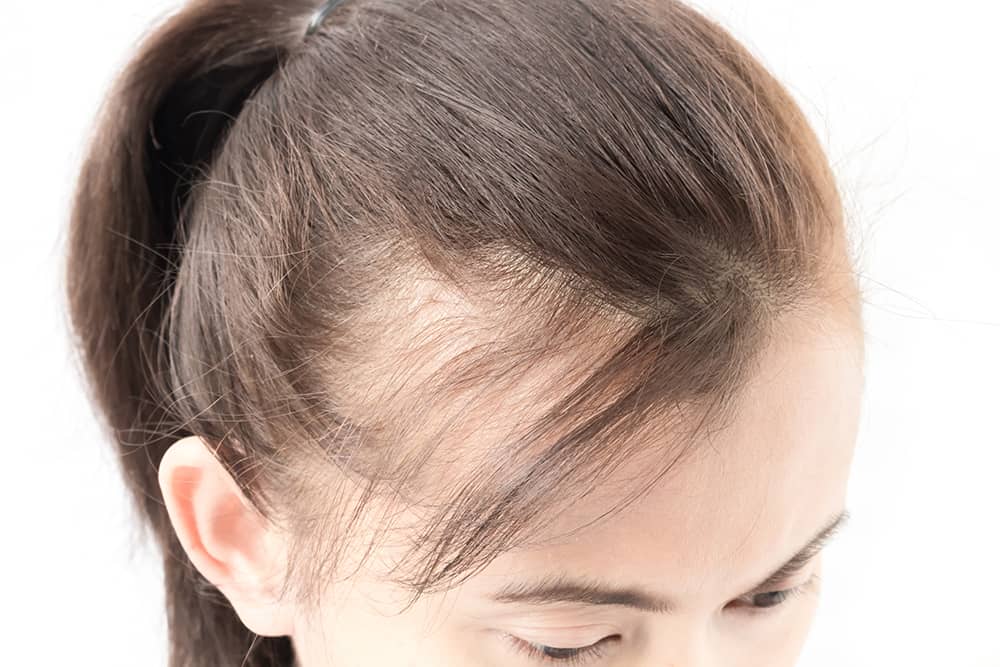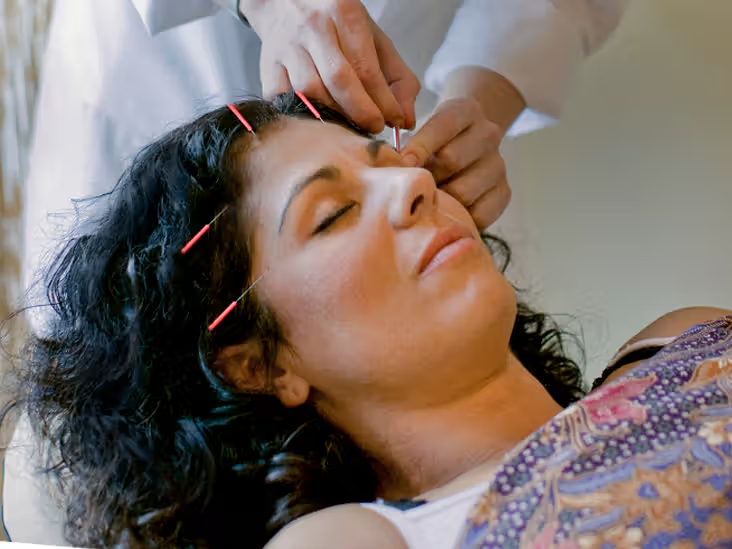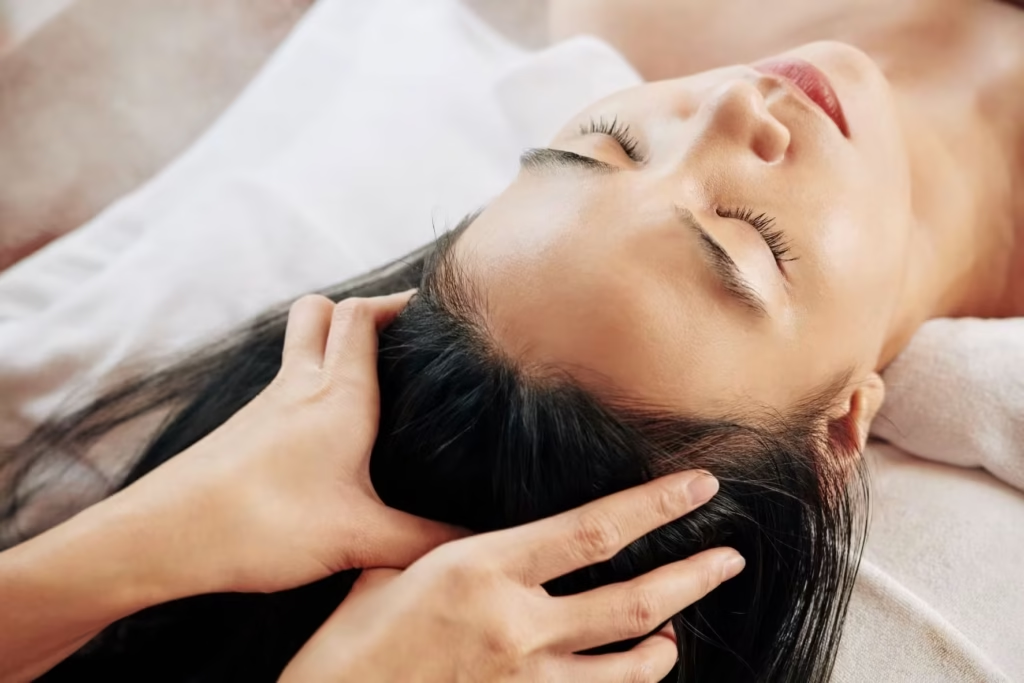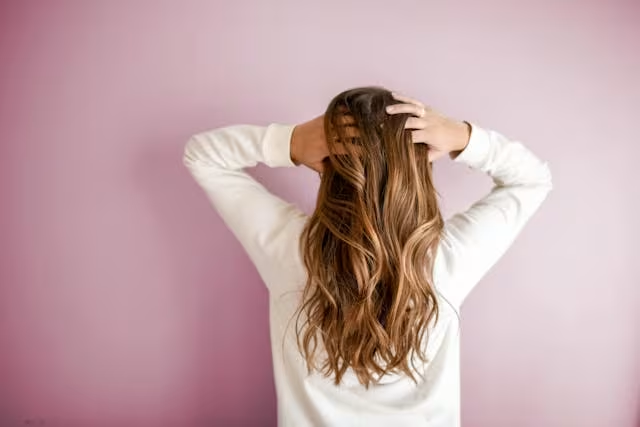Hair loss can significantly impact one’s appearance and self-confidence. If you’re experiencing thinning hair or baldness, you’re not alone.
Hair loss affects both men and women, particularly as they age, during high-stress periods, or after major life events such as childbirth.
While modern medicine offers various treatments, Traditional Chinese Medicine (TCM) provides a natural and holistic approach to addressing hair loss by treating its root causes.
In Singapore, where humid weather and fast-paced lifestyles can contribute to various health imbalances, TCM offers promising solutions for those seeking alternatives to conventional hair loss treatments.
Read more: Best TCM Clinic in Singapore (Sort by Reviews)
Understanding Hair Loss from a TCM Perspective

Traditional Chinese Medicine views hair health as a reflection of your overall internal wellness.
According to TCM principles, the quality and volume of your hair directly connect to the state of your Qi (vital life energy) and blood.
Read more: Best TCM Clinic in JB for Singaporeans
Blood Deficiency: The Primary Cause
In TCM theory, hair health is intimately linked to blood quality and circulation. Your blood carries essential nutrients required to nourish hair follicles.
Therefore, hair loss is often attributed to blood deficiency (insufficient nutrient-rich blood), poor blood circulation to the scalp, and blockages preventing nutrients from reaching hair follicles.
The Vital Organ Systems for Hair Health
TCM identifies three primary organ systems that play crucial roles in maintaining healthy hair:
Spleen functions as the source of Qi and blood in the body. It transforms nutrients from food into blood.
When compromised, it can result in blood deficiency, directly affecting nutrient supply to hair follicles.
Liver stores blood and regulates Qi movement throughout the body. It maintains smooth flow of energy and blood to the scalp.
When imbalanced (often due to stress), it can cause “Liver Qi stagnation,” leading to impaired blood flow and hair loss.
Kidneys store “Jing” (essence), which is fundamental for hair growth and color.
They determine the rate of hair growth and influence hair color. When deficient, the kidneys may result in slower hair growth, brittle hair, and premature graying.
Related article: Gua Sha in Singapore: Benefits, Techniques & Considerations
Other Contributing Factors in TCM
Damp Heat: Singapore’s hot and humid climate, combined with dietary habits like consuming spicy foods and cold drinks, can create “damp heat” in the body.
This excess heat can disrupt Qi flow to the scalp and contribute to hair loss.
Emotional Factors: Excessive stress, anxiety, and emotional trauma can lead to Liver Qi stagnation, affecting blood flow to the scalp and contributing to hair loss over time.
Types of Hair Loss Explained
Understanding the specific type of hair loss you’re experiencing helps determine the most effective TCM approach:
Male and Female Pattern Hair Loss (Androgenetic Alopecia)
- Most common form of hair loss
- In men: typically begins with receding hairline or thinning at the crown
- In women: usually presents as overall thinning, particularly at the part line
- Hereditary factors play a significant role
- From TCM perspective: often related to Kidney deficiency and/or blood stagnation
You might be interested: Cupping Therapy in Singapore: Types, Benefits
Alopecia Areata
- Autoimmune condition causing patchy hair loss
- Body’s immune system attacks hair follicles
- From TCM perspective: often linked to Liver Qi stagnation and/or Wind invasion
Scarring Alopecia
- Rare form of hair loss resulting in permanent destruction of hair follicles
- Leaves behind scar tissue where hair cannot regrow
- From TCM perspective: typically associated with excess heat and toxins
Related article: Moxibustion in Singapore: Types, Benefits
Traction Alopecia
- Results from excessive pulling force on hair (tight hairstyles, braids)
- Can lead to permanent hair loss if continued over time
- From TCM perspective: related to local blood stagnation and follicle damage
Postpartum Alopecia
- Hair loss occurring 3-4 months after childbirth
- Typically resolves within 6-12 months
- From TCM perspective: related to blood and Qi deficiency following childbirth
This might help: Tuina Massage in Singapore: Benefits and Methods
TCM Treatments for Hair Loss in Singapore
Comprehensive Diagnostic Process
Before beginning any treatment, TCM practitioners conduct a thorough diagnostic assessment to understand the root causes of hair loss.
The detailed health history includes examining the duration and pattern of hair loss, identifying potential triggers such as stress, childbirth, or dietary changes, and reviewing overall health conditions that may contribute to the problem.
The physical examination involves pulse diagnosis to assess internal organ function, tongue diagnosis to evaluate overall health status, and scalp examination to determine the specific hair loss pattern.
Body constitution analysis is also performed to identify your unique body type and tendencies while determining underlying imbalances that may be contributing to hair loss.
You might like: Acupuncture in Singapore: Types, Benefits
Acupuncture for Hair Regeneration

Acupuncture involves inserting fine needles into specific points on the body to stimulate Qi flow and restore balance. For hair loss treatment, acupuncture offers multiple benefits: enhanced blood circulation to the scalp (delivering oxygen and nutrients to hair follicles), hormonal regulation that may help balance factors contributing to hair loss, stress reduction that alleviates tension and anxiety, and strengthened hair follicles with improved function and vitality.
During acupuncture sessions for hair loss, practitioners typically target specific points on the scalp to directly stimulate local circulation, body points related to Liver, Kidney, and Spleen function, and points that regulate overall Qi and blood flow.
Clinical research supports acupuncture’s effectiveness in stimulating hair growth and reducing hair loss through these mechanisms.
Chinese Herbal Medicine
Chinese herbal formulations complement acupuncture treatments by addressing internal imbalances. These herbs may be prescribed as:
- Customized herbal teas
- Powder formulations
- Pills or capsules
- Topical applications for the scalp
Key herbs commonly used for hair loss treatment include:
| Herb | Chinese Name | Primary Benefits |
|---|---|---|
| Reishi Mushroom | Ling Zhi | Improves blood circulation, blocks DHT production |
| Angelica Root | Dong Quai | Nourishes blood, balances hormones |
| Fo-Ti | He Shou Wu | Promotes hair growth and natural hair color |
| Glossy Privet Fruit | Fructus Ligustri Lucidi | Supports kidney and liver function, improves scalp health |
| Herbal Eclipta | Eclipta Prostrata | Tonifies kidneys and liver, essential for hair health |
| Rehmannia | Shu Di Huang | Nourishes blood and kidney essence |
| Chinese Skullcap | Scutellaria Baicalensis | Reduces inflammation, improves scalp health |
| Ginseng | Ren Shen | Enhances circulation, nourishes follicles |
These herbs work synergistically to:
- Improve Qi and blood circulation to the scalp
- Restore hormonal balance
- Nourish the Kidney and Liver systems
- Provide essential nutrients for hair growth
Tuina Massage for Scalp Health

Tuina is a therapeutic massage technique that targets acupressure points to improve energy flow. For hair loss, Tuina massage focuses on the scalp to:
- Clear blockages that impede blood flow
- Stimulate hair follicles directly
- Promote relaxation and reduce tension
- Enhance the absorption of herbal treatments when applied topically
Regular Tuina massage sessions can significantly improve scalp health and create an optimal environment for hair growth.
Comprehensive Hair Growth Program
Most TCM clinics in Singapore offer integrated hair growth programs that combine multiple treatment modalities for optimal results:
- Initial Consultation and Diagnosis
- Comprehensive assessment of hair loss pattern and underlying causes
- Customized Treatment Plan
- Acupuncture sessions (typically 10-15 sessions recommended)
- Personalized herbal formulations
- Scalp massage and care techniques
- Lifestyle and Dietary Recommendations
- Specific foods to consume or avoid
- Stress management techniques
- Home care practices for scalp health
- Progress Monitoring
- Regular follow-up consultations to assess results
- Adjustments to treatment plan as needed
Lifestyle Recommendations to Support TCM Hair Loss Treatment
Dietary Guidelines
Foods to Incorporate: A balanced diet should include blood-nourishing foods like dark leafy greens, black beans, and black sesame seeds; kidney-strengthening foods such as walnuts, black beans, and goji berries; antioxidant-rich foods including berries, green tea, and turmeric; protein-rich foods like eggs, fish, and lean meats; and omega-3 sources such as fatty fish, flaxseeds, and walnuts.
Foods to Moderate or Avoid: Try to limit “heating” foods that add excess heat to blood (alcohol, spicy foods, fried foods), processed foods and refined sugars, excessive cold or raw foods that can impair digestion, and dairy products, especially for those with dampness issues.
Cooking Methods
Dietary preparation plays an important role in supporting hair health through Traditional Chinese Medicine principles.
Practitioners recommend preferring gentler cooking methods such as steaming, blanching, and boiling while limiting frying, roasting, and barbecuing, which introduce excess heat that may worsen internal imbalances.
Including warming spices like ginger and cinnamon in moderate amounts can aid circulation and support the body’s natural healing processes.
Stress Management
Effective stress management is crucial for addressing hair loss from a TCM perspective.
Regular meditation or deep breathing exercises help calm the mind and reduce internal tension.
Incorporating gentle exercise like tai chi or qigong promotes energy flow and overall wellness while supporting hair health.
Ensuring adequate sleep, ideally before 11 PM, supports proper Liver function according to TCM principles.
Creating work-life balance to reduce chronic stress is essential, as persistent stress can disrupt the body’s natural rhythms and contribute to hair loss.
Home Care Practices
Daily scalp massage using fingertips to gently massage the scalp in circular motions for five minutes morning and night can improve circulation and stimulate hair follicles.
Proper hair care involves avoiding excessive heat styling, harsh chemical treatments, and tight hairstyles that can damage hair and scalp.
Choosing gentle, chemical-free natural hair products when possible reduces exposure to potentially harmful substances.
Scalp protection from excessive sun exposure and environmental pollutants helps maintain a healthy environment for hair growth.
Effectiveness of TCM for Hair Loss
While individual results vary, many people experience positive outcomes from TCM treatments for hair loss across several measurable areas.
Reduced hair shedding is often the first noticeable improvement, usually occurring within four to six weeks of consistent treatment.
Improved hair texture becomes evident as existing hair becomes stronger and more resilient over time.
New hair growth may appear as fine, new hair in previously thinning areas after consistent treatment, though this typically requires longer-term commitment.
Enhanced overall health is frequently reported as internal imbalances are addressed, with many patients experiencing improvements in energy levels, sleep quality, and stress management.
It’s important to note that TCM approaches hair loss as a symptom of internal imbalance rather than as an isolated condition, focusing on treating the underlying causes for comprehensive and lasting results.
Choosing a TCM Clinic for Hair Loss Treatment in Singapore
When selecting a TCM clinic for hair loss treatment, consider these factors:
Practitioner Qualifications: Look for licensed TCM physicians with formal training and certification, and check for specialization or experience in treating hair and scalp conditions.
Clinic Reputation: Read reviews from previous patients, ask for before/after results when available, and seek recommendations from trusted sources.
Treatment Approach: Prefer clinics offering comprehensive diagnosis and personalized treatment. Be wary of one-size-fits-all approaches or those promising instant results, and look for integrated programs combining multiple TCM modalities.
Facilities and Hygiene: Ensure the clinic has clean, well-maintained treatment rooms, proper sterilization of acupuncture needles, and a professional environment.
Communication: The clinic should provide clear explanation of your condition and treatment plan, transparent pricing and expected timeline, and willingness to answer questions and address concerns.
Integrating TCM with Modern Hair Loss Treatments
TCM can work effectively alongside conventional hair loss treatments. Many patients choose an integrated approach that includes:
- TCM treatments addressing root causes and internal balance
- Modern treatments targeting specific hair growth mechanisms
- Nutritional supplements supporting overall hair health
- Topical applications to strengthen existing hair
Always inform both your TCM practitioner and conventional healthcare providers about all treatments you’re receiving to ensure compatibility and optimal results.
Realistic Expectations and Timeline
Hair growth is a gradual process, and TCM approaches focus on sustainable, long-term results rather than quick fixes:
- Initial Phase (1-3 months): Addressing underlying imbalances, reducing hair loss
- Growth Phase (3-6 months): Strengthening existing hair, stimulating new growth
- Maintenance Phase (6+ months): Supporting continued hair health and preventing recurrence
Most patients require 10-15 acupuncture sessions before seeing significant results, with ongoing herbal support and lifestyle modifications for optimal outcomes.
Frequently Asked Questions
How does TCM explain the connection between internal health and hair loss?
Hair receives nourishment through blood, so any deficiency or circulation problem can affect hair health.
Additionally, the Kidney system stores “Jing” (essence), which determines hair growth rate and color.
When these systems become imbalanced due to factors like stress, poor diet, or aging, hair loss can occur as a manifestation of these internal issues.
What makes TCM different from conventional hair loss treatments?
Conventional treatments often focus directly on the hair follicles or hormonal factors affecting hair growth.
While effective for some, these approaches may not address underlying imbalances.
TCM takes a holistic view, treating not just the symptom (hair loss) but the root causes within your body systems.
Rather than targeting a single mechanism, TCM works to restore overall balance, improving hair health as part of comprehensive wellness.
Is TCM treatment for hair loss painful?
Acupuncture for hair loss is generally well-tolerated. Most patients experience minimal discomfort during needle insertion, often described as a slight pinch or tingling sensation.
The ultra-thin needles used in modern practice are much finer than those used for injections.
Some acupuncture points may produce a dull ache or warm sensation when stimulated, which is considered positive as it indicates Qi movement.
Scalp acupuncture specifically tends to be less sensitive than other body areas due to fewer nerve endings.
How many TCM treatment sessions are typically needed for hair loss?
Most practitioners recommend a course of 10-15 acupuncture sessions for noticeable improvement in hair loss conditions.
These are typically scheduled 1-2 times weekly initially, then reduced in frequency as improvement occurs.
Herbal treatments often continue for 3-6 months, with formulas adjusted as your condition changes.
The exact treatment duration varies based on your specific condition, severity of hair loss, underlying causes, and how your body responds to treatment.
Can TCM treatments reverse male or female pattern baldness?
TCM can help manage pattern baldness by improving blood circulation to hair follicles, balancing hormones, and addressing nutritional deficiencies contributing to hair loss.
While genetically influenced pattern baldness may not be completely reversed, many patients experience a significant slowing of hair loss progression and improvement in existing hair quality.
Some may achieve partial regrowth, particularly in areas where follicles are dormant but not completely inactive.
Results vary based on individual factors like duration of hair loss, age, and overall health.
Are there any side effects from TCM hair loss treatments?
TCM treatments for hair loss generally have minimal side effects when performed by qualified practitioners.
Occasional mild bruising or soreness at acupuncture sites may occur but typically resolves quickly.
Herbal medicines may cause digestive adjustments in some individuals when first starting treatment.
Unlike some pharmaceutical hair loss treatments, TCM approaches rarely cause sexual dysfunction, hormonal imbalances, or other systemic side effects.
Always inform your practitioner about any medications you’re taking to prevent potential interactions with herbal formulas.
How do I know if I’m a good candidate for TCM hair loss treatment?
Most people with hair loss can benefit from TCM approaches, particularly those with recent onset hair loss, stress-related hair thinning, postpartum hair loss, hair loss accompanied by other symptoms like fatigue or digestive issues, and those seeking natural alternatives to medication.
During your initial consultation, the TCM physician will evaluate your specific condition and advise whether TCM is suitable for your situation.
Even in longstanding pattern baldness, TCM can often improve hair quality and slow progression, though complete reversal may not be possible in advanced cases.
Can I continue using my regular hair products during TCM treatment?
Yes, you can generally continue using your regular hair products during TCM treatment.
However, your practitioner may recommend switching to milder, more natural products that support scalp health.
Harsh chemical treatments, permanent hair dyes, and heat styling tools may counteract some benefits of TCM treatments and should be minimized.
Some TCM clinics may suggest specific herbal shampoos or topical applications that complement your treatment plan.
What lifestyle factors most impact the success of TCM hair loss treatment?
Several lifestyle factors significantly influence the effectiveness of TCM hair loss treatments.
These include maintaining a balanced diet rich in hair-nourishing nutrients, following regular sleep patterns that support Liver and Kidney function, practicing relaxation techniques to reduce stress-related hair loss, engaging in moderate physical activity to promote circulation, and avoiding harmful habits such as smoking, alcohol consumption, and excessive caffeine.
Your TCM practitioner will provide personalized lifestyle recommendations based on your specific diagnosis and constitution.
Does insurance cover TCM treatments for hair loss in Singapore?
Coverage for TCM treatments varies widely among insurance providers in Singapore.
Some integrated shield plans and corporate health insurance policies offer partial coverage for TCM consultations and treatments.
However, treatments specifically for hair loss are often considered aesthetic rather than medically necessary and may not be covered.
Check with your insurance provider for specific details regarding coverage limitations and claim procedures.
Some TCM clinics offer package pricing for hair loss treatment programs that may provide better value than individual session payments.
How do I maintain results after completing a TCM hair treatment program?
Maintaining results after completing your initial treatment program typically involves:
- Following a maintenance schedule of less frequent acupuncture sessions (perhaps monthly)
- Continuing appropriate herbal formulations, possibly at reduced dosage
- Adhering to dietary and lifestyle recommendations
- Practicing regular scalp massage and care techniques learned during treatment
- Addressing new stressors or health issues promptly before they affect hair health
Many patients find that incorporating TCM principles into their ongoing lifestyle helps sustain improvements in hair health and prevents recurrence of significant hair loss.

